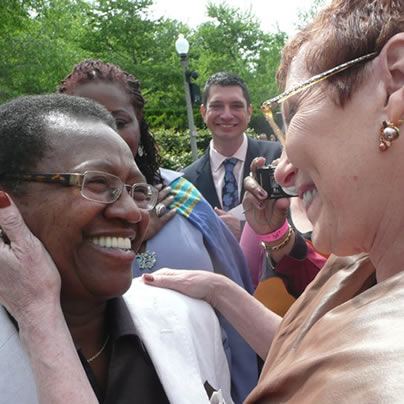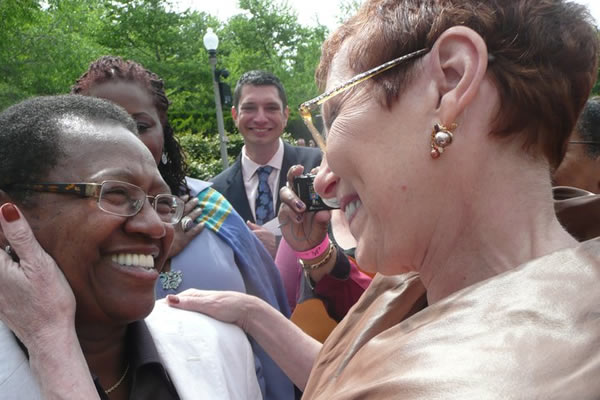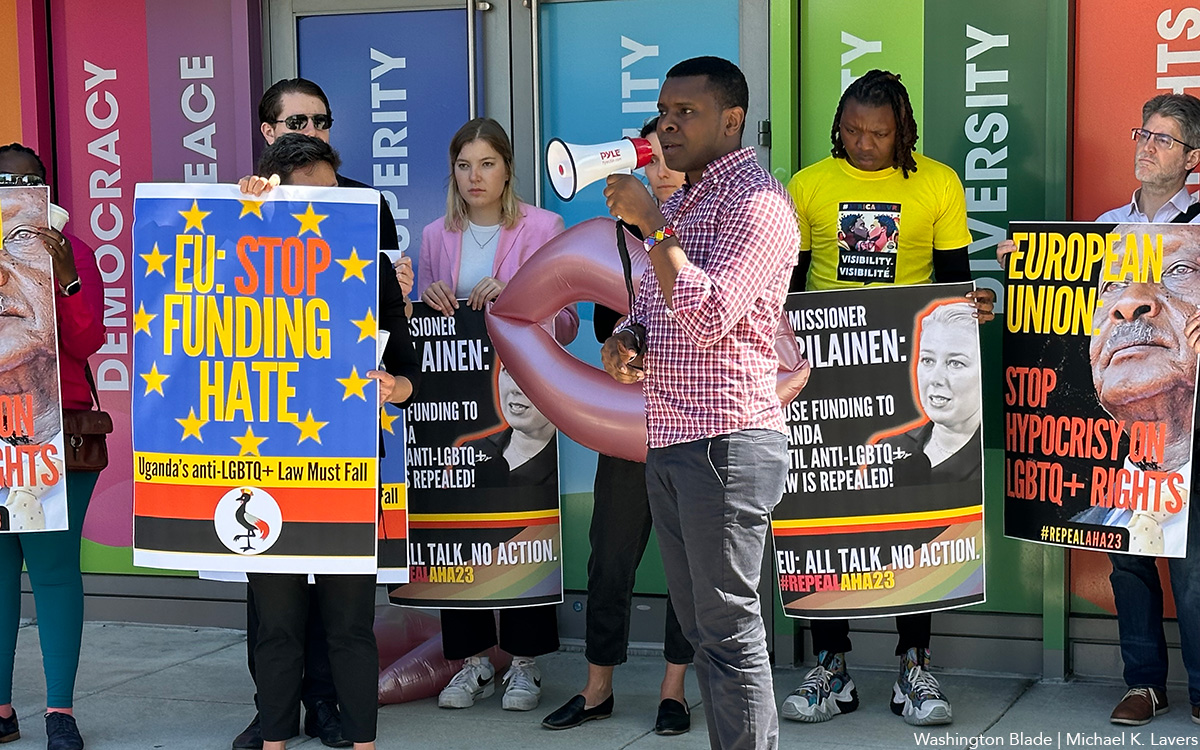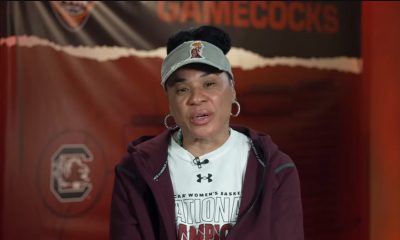News
Court rules gay couples can marry now in Chicago area
LGBT advocates say ruling should apply statewide


Vernita Gray (left) and Patricia Ewert became the first gay couple to wed in Cook County.(Photo courtesy Lambda Legal).
A federal court in Illinois ruled on Friday gay couples can marry immediately in the Chicago-area Cook County without waiting for the marriage equality law to take effect in June.
Meanwhile, LGBT advocates behind the lawsuit are interpreting the decision to mean clerks across the state should begin granting marriage licenses to same-sex couples.
In a brief four-page order, U.S. District Judge Sharon Johnson Coleman, an Obama appointee, says Cook County can no longer prohibit gay couples from marrying because the marriage ban violates the Fourteenth Amendment to the U.S. Constitution.
“There is no reason to delay further when no opposition has been presented to this Court and committed gay and lesbian couples have already suffered from the denial of their fundamental right to marry,” Coleman writes.
As Coleman notes, “there is no opposition” to the ruling because Cook County Clerk David Orr and Illinois Attorney General Lisa Madigan weren’t defending the marriage law in court. Both Orr and Madigan filed briefs in support of the plaintiff same-sex couples in the case.
Although Gov. Pat Quinn signed into law a bill legalizing same-sex marriage in Illinois, the measure won’t take effect until June.
The class-action lawsuit, Lee v. Orr, was filed by Lambda Legal and ACLU of Illinois of behalf of same-sex couples seeking to wed before that time in Cook County. The named plaintiffs in the lawsuit — Elvie Jordan and Challis Gibbs as well as Ronald Dorfman and Ken Ilio — are facing terminal illness.
In her ruling, Coleman invokes the legacy of civil rights leader Martin Luther King, Jr., to explain her decision to allow gay couples in Cook County to wed immediately.
“Since the parties agree that marriage is a fundamental right available to all individuals and should not be denied, the focus in this case shifts from the ‘we can’t wait for the terminally ill individuals to ‘why should we wait’ for all gay and lesbian couples who want to marry,” Coleman writes. “To paraphrase Dr. Martin Luther King, Jr., the time is always ripe to do right.”
Bernard Cherkasov, CEO of Equality Illinois, praised Coleman for a ruling that he said would bring justice to thousands of same-sex couples.
“Tens of thousands of Illinois couples have been waiting for a long time, some for decades, for their love, commitment and marriage to be recognized,” Cherkasov said. “This day – and the opportunity to finally get married – could not have come sooner. We congratulate all of the couples and their families, and the people of Illinois on this significant day.”
Orr said in a statement the Bureau of Vital Records would be open an extra two hours on Friday until 7 p.m. to accommodate couples seeking to wed in the wake of the court order.
“I’m thrilled same-sex couples who want to get married won’t have to wait any longer,” Orr said. “We are very excited to celebrate this historic milestone with every loving couple from today onward.”
According to Cook County, marriage licenses are valid from the day after issuance and for 60 days, so couples that obtain a marriage license on March 1 may get married between March 2 and April 30.
Moreover, the $60 license fee will be waived for couples already in a civil union. Couples that wish to convert their prior civil union date to a marriage will have to wait until June 1 because it was not addressed in Coleman’s order.
There are differing accounts about the scope of the opinion. Coleman writes her ruling only applies to Cook County because of the nature of the lawsuit.
“Although this court finds that the marriage ban for same-sex couples violates the Fourteenth Amendment Equal Protection Clause on its face, this finding can only apply to Cook County based on the posture of the lawsuit,” Coleman said.
But LGBT advocates are interpreting the ruling differently and say clerks across Illinois should start affording marriage licenses to same-sex couples.
Erik Roldon, a Lambda spokesperson, said no clerk in Illinois has authority to enforce the marriage ban in the aftermath of the decision.
“The law was declared facially unconstitutional,” Roldan said. “That means there are no circumstances under which it can be enforced – in Cook or elsewhere.”
Edwin Yohnka, a spokesperson for the ACLU of Illinois, shared that assessment of the ruling.
“The court found the current marriage ban to be unconstituional,” Yohnka said. “We would hope that all clerks would read that decision. If they do, we believe that they would not want to be in the position of enforcing a law that has been found unconstitutional.”
Gay couples that marry as a result of the court decision would not be the first to do so in Illinois. Vernita Gray and Patricia Ewert married in Cook County in November as a result of a federal court saying they should be afforded a marriage license immediately because Gray has been diagnosed with terminal breast cancer.
European Union
Activists demand EU sanction Uganda over Anti-Homosexuality Act
Yoweri Museveni signed law on May 29, 2023

More than a dozen activists who protested in front of the European Union Delegation to the United States in D.C. on Thursday demanded the EU to sanction Uganda over the country’s Anti-Homosexuality Act.
Hillary Innocent Taylor Seguya, a Ugandan LGBTQ activist, and Global Black Gay Men Connect Executive Director Micheal Ighodaro are among those who spoke at the protest. Health GAP Executive Director Asia Russell also participated in the event that her organization organized along with GBGMC and Convening for Equality Uganda, a Ugandan LGBTQ rights group.
Ugandan President Yoweri Museveni last May signed the Anti-Homosexuality Act that, among other things, contains a death penalty provision for “aggravated homosexuality.”
The country’s Constitutional Court on April 3 refused to “nullify the Anti-Homosexuality Act in its totality.” A group of Ugandan LGBTQ activists have appealed the ruling.
A press release that Health GAP issued ahead of Thursday’s protest notes EU Commissioner for International Partnerships Jutta Urpilainen on March 6 announced more than €200 million ($212.87 million) for Uganda in support of “small business owners, young female entrepreneurs, agribusinesses as well as vital digital infrastructure projects in full Team Europe format with the European Investment Bank (EIB) and several member states.”
“These concrete initiatives will make a difference to aspiring entrepreneurs, Ugandan businesses and create jobs in multiple sectors,” said Urpilainen in a press release that announced the funds. “This is a perfect example of how Global Gateway can make a tangible difference for citizens and businesses and unlock the full potential of a partner country by working together.”
Convening for Equality Uganda on Tuesday in a letter they sent to Urpilainen asked the EU to review all funding to Uganda and “pause or reprogram any funds that go via government entities.” The protesters on Thursday also demanded European Commission President Ursula von der Leyen “to hold Ugandan President Museveni’s government accountable for this attack on human rights.”
Josep Borrell, the EU’s top diplomat, in a statement he released after Museveni signed the Anti-Homosexuality Act said the law “is contrary to international human rights law and to Uganda’s obligations under the African Charter on Human and People’s Rights, including commitments on dignity and nondiscrimination, and the prohibition of cruel, inhuman or degrading punishment.”
“The Ugandan government has an obligation to protect all of its citizens and uphold their basic rights,” said Borrell. “Failure to do so will undermine relationships with international partners.”
“The European Union will continue to engage with the Ugandan authorities and civil society to ensure that all individuals, regardless of their sexual orientation and gender identity, are treated equally, with dignity and respect,” he added.
Urpilainen last September in a letter to the European Parliament said the EU would not suspend aid to Uganda over the law.
Politics
Court records raise concerns about right-wing TikTok investor’s influence
Jeff Yass is a Pa. billionaire who has funded anti-LGBTQ causes

The role played by Pennsylvania billionaire Jeff Yass in the creation of TikTok might be far greater than was previously understood, according to new reporting that raises questions about the extent of the right-wing megadonor’s influence over matters at the intersection of social media, federal regulations, and electoral politics.
In 2012, Yass’s firm, Susquehanna International Group, spent $5 million for 15 percent of the short-form video hosting platform’s Chinese-owned parent, ByteDance. In the years since, as TikTok grew from a nascent startup to a tech giant with 1.5 billion active monthly users and an estimated $225 billion valuation, Yass and his firm pocketed tens of billions of dollars.
Beyond the size of Susquehanna’s ownership stake, little was known about its relationship with ByteDance until documents from a lawsuit filed against the firm by its former contractors were accidentally unsealed last month, leading to new reporting by the New York Times on Thursday that shows Susquehanna was hardly a passive investor.
In 2009 the firm used a proprietary, sophisticated search algorithm to build a home-buying site called 99Fang, tapping software engineer and entrepreneur Zhang Yiming to serve as its CEO. The company folded. And then, per the Times’s review of the court records, in 2012 Susquehanna picked Yiming to be the founder of its new startup ByteDance and repurposed the technology from 99Fang for use in the new venture.
Importantly, the documents do not provide insight into Yass’s personal involvement in the formation of ByteDance. And Susquehanna denies that the company’s search algorithm technologies were carried over from the real estate venture — which, if true, would presumably undermine the basis for the lawsuit brought by the firm’s former contractors who are seeking compensation for the tech used by ByteDance.
Questions about Yass’s influence come at a pivotal political moment
In recent weeks, federal lawmakers have moved forward with a proposal that would force ByteDance to divest TikTok or ban the platform’s use in the U.S. altogether, citing the potential threats to U.S. national security interests stemming from the company’s Chinese ownership.
The bill was passed on March 13 with wide bipartisan margins in the House but faced an uncertain future in the Senate. However, on Wednesday, House Speaker Mike Johnson (R-La.) announced plans to fold the proposal into a measure that includes foreign aid to Ukraine, Israel, and Taiwan, likely bolstering its chances of passage by both chambers.
Last month, shortly after meeting with Yass at his home in Mar-a-Lago, former President Donald Trump changed his longtime stance and came out against Congress’s effort to break up or ban TikTok. The timing led to speculation about whether the billionaire businessman was behind Trump’s change of heart, perhaps by contributing to the cash-strapped Republican presidential nominee’s electoral campaign or through other means.
Meanwhile, Yass has emerged as the largest donor of the 2024 election cycle. A coalition of public interest and government watchdog groups have called attention to the vast network of right-wing political causes and candidates supported by the billionaire, often via contributions funneled through dark money PACs that are designed to conceal or obscure the identities of their donors.
The Action Center on Race and the Economy, Make the Road, POWER Metro: Faith in Action, Free the Ballot, and Little Sis launched a website called All Eyes on Yass that features research into the various causes he supports, along with insight into the networks connecting the entities funded by his contributions.
Broadly, in Pennsylvania they fall into five categories: Advocacy against reproductive freedom and LGBTQ rights via the Pennsylvania Family Institute, lobbying on behalf of oil and gas industry interests by the Pennsylvania Manufacturers’ Association, anti-union groups supported by Commonwealth Partners, a privately owned registered investment advisory firm/independent broker-dealer, the Commonwealth Foundation for Public Policy Alternatives, which seeks to privatize public schools and defeat proposed increases to the minimum wage, and the Citizens Alliance of Pennsylvania, which advocates for lowering taxes on corporations and the rich.
Additionally, All Eyes on Yass reports that the billionaire has given massive contributions to Club for Growth and direct spending to support the electoral campaigns of right-wing Republicans including Florida Gov. Ron DeSantis; U.S. Sens. Ted Cruz (Texas), Rand Paul (Ky.), and Josh Hawley (MO); U.S. Rep. Lauren Boebert (Colo.), and former U.S. Rep. Madison Cawthorn (N.C.).
District of Columbia
New D.C. LGBTQ+ bar Crush set to open April 19
An ‘all-inclusive entertainment haven,’ with dance floor, roof deck

D.C.’s newest LGBTQ+ bar called Crush is scheduled to open for business at 4 p.m. on Friday, April 19, in a spacious, two-story building with a dance floor and roof deck at 2007 14th St., N.W. in one of the city’s bustling nightlife areas.
A statement released by co-owners Stephen Rutgers and Mark Rutstein earlier this year says the new bar will provide an atmosphere that blends “nostalgia with contemporary nightlife” in a building that was home to a popular music store and radio supply shop.
Rutgers said the opening comes one day after Crush received final approval of its liquor license that was transferred from the Owl Room, a bar that operated in the same building before closing Dec. 31 of last year. The official opening also comes three days after Crush hosted a pre-opening reception for family, friends, and community members on Tuesday, April 16.
Among those attending, Rutgers said, were officials with several prominent local LGBTQ organizations, including officials with the DC Center for the LGBTQ Community, which is located across the street from Crush in the city’s Reeves Center municipal building. Also attending were Japer Bowles, director of the Mayor’s Office of LGBTQ Affairs, and Salah Czapary, director of the Mayor’s Office of Nightlife and Culture.
Rutgers said Crush plans to hold a grand opening event in a few weeks after he, Rutstein and the bar’s employees become settled into their newly opened operations.
“Step into a venue where inclusivity isn’t just a promise but a vibrant reality,” a statement posted on the Crush website says. “Imagine an all-inclusive entertainment haven where diversity isn’t just celebrated, it’s embraced as the very heartbeat of our venue,” the statement says. “Welcome to a place where love knows no bounds, and the only color or preference that matters is the vibrant tapestry of humanity itself. Welcome to Crush.”
The website says Crush will be open Tuesdays and Wednesdays from 4 p.m. to 12 a.m., Thursdays from 4 p.m. to 2 a.m., Fridays from 4 p.m. to 3 a.m., Saturdays from 2 p.m. to 3 a.m., and Sundays from 2 p.m. to 12 a.m. It will be closed on Mondays.
Crush is located less than two blocks from the U Street Metro station.
-

 Africa4 days ago
Africa4 days agoCongolese lawmaker introduces anti-homosexuality bill
-

 World4 days ago
World4 days agoOut in the World: LGBTQ news from Europe and Asia
-

 District of Columbia3 days ago
District of Columbia3 days agoReenactment of first gay rights picket at White House set for April 17
-

 Africa3 days ago
Africa3 days agoUgandan activists appeal ruling that upheld Anti-Homosexuality Act












